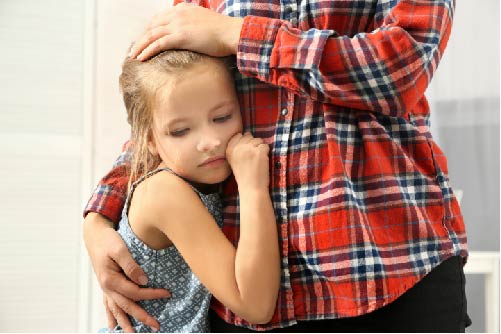Anxiety About Our Children’s Well-Being

“There really are places in the heart
you don’t even know exist
until you love a child”
Anne Lamott
When our children are suffering, it is instinctual to want to do what we can to relieve them from any painful situation they are in. Their pain is also our pain and we want to get rid of it as soon as possible. We strive to protect them from the inevitable hurts and disappointments in life, and to know they are always safe.
A friend of mine aptly expressed this ubiquitous parental vulnerability as akin to having your heart walking around outside your body, unprotected. This is the plight of being a parent. Loving and vulnerability go hand in hand. The deeper the love, the more vulnerable our hearts are.
Certain conditions or situations may trigger especially heightened anxiety about our children’s well-being. The common parental response in these situations is to try to step in and do what we can to fix the situation. The hope is that this will provide the satisfaction of being able to relieve our children of their discomfort, or provide emotional or physical safety while simultaneously assuaging our own angst that they are suffering.
With very young children, with illness, with abuse, and of course with any life-threatening situation this is the most appropriate response on our part.
In many situations, however, stepping in to fix the problem can backfire, and instead reinforce it. When we try to fix it for them, we may relieve ourselves of some anxiety, but we are not supporting our children in developing the abilities and confidence they need to manage their own lives. In stepping in to fix the situation for them we can unwittingly be supporting a ‘victim’ stance and rob them of the satisfaction of being able to help themselves.
Our children need our support, love, guidance, and confidence in their abilities. This is easier to provide for them when we are not overly concerned or anxious about the situation at hand. However, when the alarming situation or condition is chronic and/or potentially life threatening, it is exceptionally difficult to not respond from a state of overwhelming anxiety.
Anxiety-driven responses (and the resulting compulsion to “fix”) emanate from a brain that is dominated by the fight or flight mode. In this mode, we are biologically prepared to respond to real or perceived danger. This state is especially heightened if we feel our child is in danger and s/he is not appearing to be able to manage this situation adequately.
The fight or flight mode is not a measured, thoughtful state. It prepares us to react quickly to danger. It is an impulsive, survival-dominated state, where our behavior is more instinctually and physiologically driven than carefully thought out.
Our ability to think things through, see from a larger perspective, exercise good judgement, and plan out our responses is diminished when we are in this state. Unless there is urgent immediate danger, we can best respond to our children when we are not in fight or flight mode and have access to our ability to think clearly and with perspective.
The problem is that we can become neurologically primed to easily shift into fight or flight mode. When this happens, anxiety becomes a constant companion. The greater the real or imagined danger our children are in, the more often it has occurred, and the more it triggers our own personal history of fight or flight mode experiences, the more strongly we react. This is especially true for anyone with a history of trauma, abuse, neglect, or any other life situation that resulted in a sense of a lack of safety.
Over time, a state of vigilance can start to dominate our responses to life. This can result in chronic anxiety, tension, over-reactions, jumpiness, and insomnia. Not the best state to be in when we are trying to be helpful to our children!
This “Managing Anxiety” category of my blog will address many ways of learning to regulate your inner state so that you can respond to your child’s needs (as well as everyday life) in the most helpful way possible.
